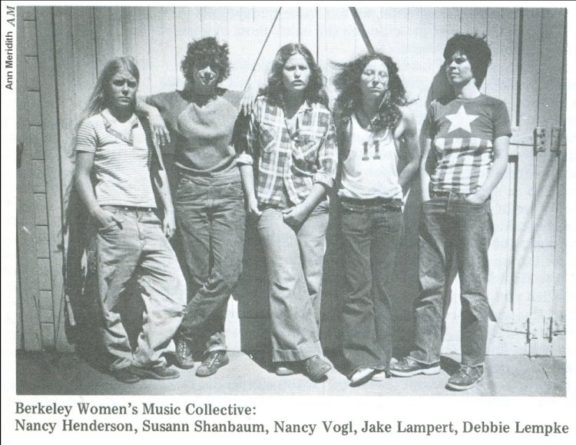In this early photo of the Berkeley Women’s Music Collective, taken just as the band was coalescing, the dress of the women in the collective suggests just how much they were set apart from the dominant music industry. Because the photo includes Jake Lampert, who left the band in 1973 to play drums in the Bay Area women’s band Bebe K’Roche, it can be dated to around 1973.
Their style of dress — T-shirts or sweatshirts or flannel shirts, worn and loose-fitting jeans or pants — is casual, as is their pose before the camera. They appear to offer themselves as they are, each member of the band dressing in whatever way suits them (rather than dressing in matching outfits, or aiming primarily to please the person behind the camera or their imagined audience). The BWMC broke with the usual expectation, of popular musicians and especially of female performers, that they were to offer themselves as beautiful, charismatic, or otherwise magnetic. The band personified the DIY spirit of the women’s music movement: they were less interested in monetary success, and more interested in the mission of creating a new space for women’s music, with their music leading the way.
***
In a recent interview, Suzanne Shanbaum spoke to the band’s lifestyle and beliefs: “We would do everything ourselves. I mean, I would fix the van. Every few days I’d have to get under there and adjust the steering box because we would turn the wheel and it didn’t do anything. We were scrappy, hungry kids that these big beliefs and a mission and big chips on our shoulders.”
“We played this Santa Cruz festival one time where the Gang Band was playing, they were a Sonoma County band with a man in it and we found their material to be offensive. So I climbed up on the stage and turned off the power and then they threw me off the stage and some people caught me. We just couldn’t take the way it was. We had to change the way it was. We could not take it.”
In the same interview, Shanbaum speculated that “the cute pictures of the band” had helped the Collective get into retrospective documentaries and articles on 1970s feminism: “Well, we have been included in some of these retrospective videos. The reason I suspect that we were included is because somebody remembers us and we have a lot of cute pictures of ourselves in T-shirts that look like a grunge band of today. So we get in that way. And the people that were more successful in those days look fussy now.”
Though it dates from a slightly earlier moment, this photo appeared on the LP insert of the 1977 Olivia Records compilation album Lesbian Concentrate, which was produced in response to Anita Bryant’s “Save Our Children” campaign. The Berkeley Women’s Music Collective song “Gay and Proud” was featured on this album.
